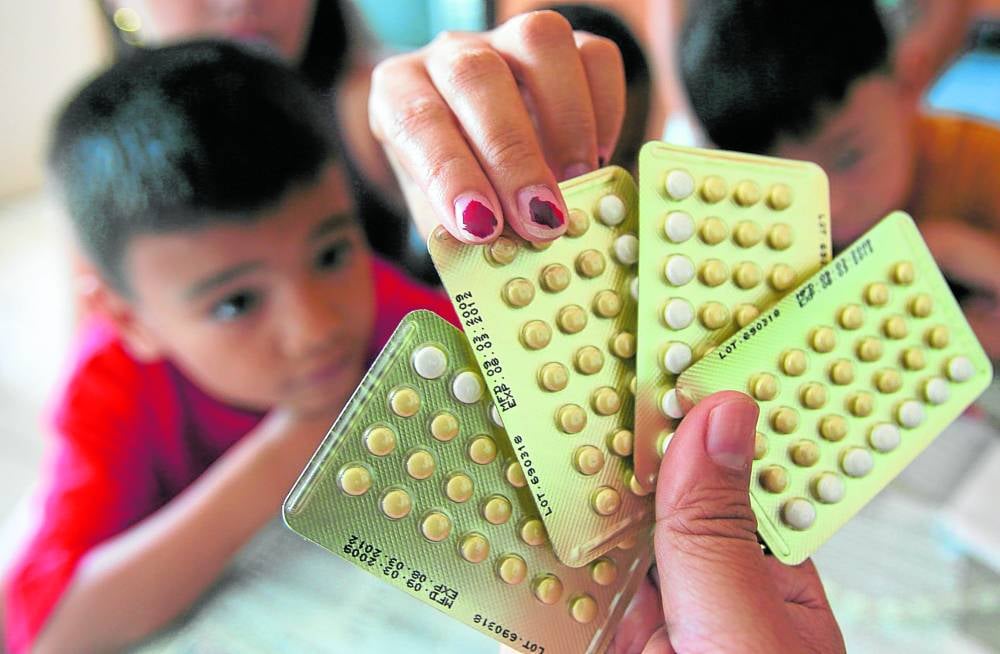
NEVER TOO YOUNG? Birth control pills are distributed at a health center in Barangay Batasan Hills, Quezon City, in this Inquirer file photo. Seven House bills that have passed deliberations at the committee level want contraceptives to be available to people of a younger set without the need for parental consent, but under certain conditions. —MARIANNE BERMUDEZ
Proposals to let younger people use contraceptives without the need for parental consent and under certain conditions are gaining ground at the House of Representatives.
The House committee on youth and sports development has passed seven bills potentially reshaping the national policy on the prevention of adolescent pregnancies.
These are House Bill No. 79 filed by Albay Rep. Edcel Lagman, HB 2062 by Rizal Rep. Juan Fidel Felipe Nograles, HB 2524 by Calamba City Rep. Charisse Anne Hernandez, HB 3211 by Samar Rep. Stephen James Tan, HB 5559 by Quezon City Rep. Patrick Vargas, HB 6901 by La Union Rep. Francisco Paolo Ortega and HB 6964 by Kabataan Rep. Raoul Danniel Manuel.
Deliberations
They hurdled deliberations at the committee chaired by Isabela Rep. Faustino Michael Dy III, Lagman said on Friday.
In a statement, Lagman said allowing adolescents to access modern contraceptives was “impressed with the State’s interest.”
This is because “adolescent pregnancy, particularly from ages 10 to 14, has become a national social emergency and adolescent pregnancy and childbirth account for the highest rate of maternal mortality,” he said. “Early childbearing is a leading factor in intergenerational poverty; and it is a speculative and mistaken notion that access to contraceptives will lead to adolescent promiscuity.”
‘Right to healthy lives’
In a sponsorship speech during a hearing on the bills on Thursday, Lagman said “adolescent mothers should be fixtures of the past, but until today teenage mothers still abound even in progressive and developed countries.”
“Young people have the right to lead healthy lives and the means to protect their health and safeguard their future. This includes access to reproductive health information, services, and commodities,” he said.
The House committee is preparing a substitute bill to integrate the seven bills that had been approved and incorporate other amendments.
Lagman said the provision on allowing adolescents to gain access to contraceptives “will complement the mandatory reproductive health and sexuality education provided for in Republic Act No. 10354, or the 2012 Responsible Parenthood and Reproductive Health Act.”
With conditions
“As approved by the committee, access to reproductive health services shall be made available under certain conditions,” he said.
Adolescents age 15 to 17 can access reproductive health services and commodities without a parent or guardian’s consent, “in keeping with the principle of the evolving capacities of the child.”
Adolescents below 15 who have already begun child bearing, or experienced sexual abuse, miscarriage, or are sexually active or engaged in high-risk behavior will have full access to reproductive health services without a parent or guardian’s consent “in keeping with the mature minor doctrine.”
If a person is below 15 and is mentally incapacitated, or in any other case not covered by the aforementioned conditions, consent must be obtained from a parent or legal guardian.
If a child’s parents or legal guardian cannot be located despite reasonable efforts, or if the child’s parent or legal guardian refuses to give consent, the consent will be obtained from a duly licensed and trained health-care service provider.
RELATED STORIES
Teen pregnancies now ‘nat’l social emergency’
PopCom clarifies: Teen pregnancy rate much worse
Duterte to Catholic Church: Let priests marry, allow public to use birth control pills